 Petzlover
Petzlover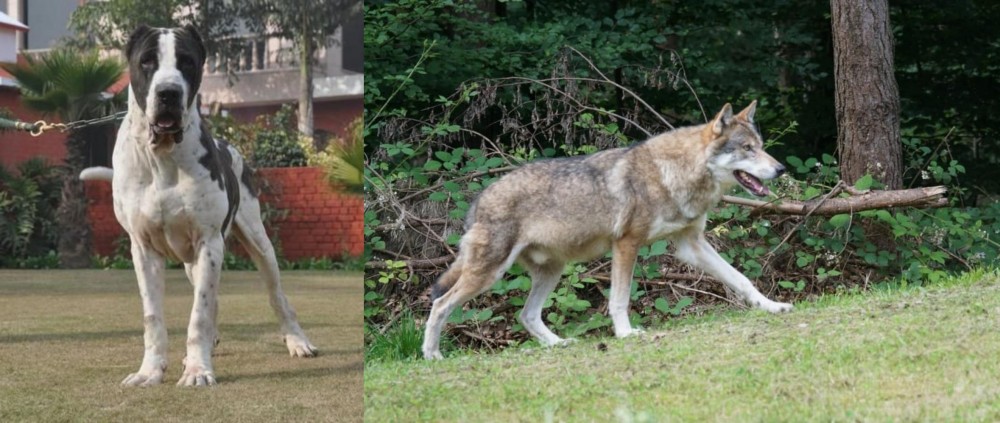 Bully Kutta is originated from India but Tamaskan is originated from United Kingdom. Bully Kutta may grow 18 cm / 8 inches higher than Tamaskan. Bully Kutta may weigh 45 kg / 100 pounds more than Tamaskan. Bully Kutta may live 3 years less than Tamaskan. Both Bully Kutta and Tamaskan has same litter size. Both Bully Kutta and Tamaskan requires Low Maintenance.
Bully Kutta is originated from India but Tamaskan is originated from United Kingdom. Bully Kutta may grow 18 cm / 8 inches higher than Tamaskan. Bully Kutta may weigh 45 kg / 100 pounds more than Tamaskan. Bully Kutta may live 3 years less than Tamaskan. Both Bully Kutta and Tamaskan has same litter size. Both Bully Kutta and Tamaskan requires Low Maintenance.
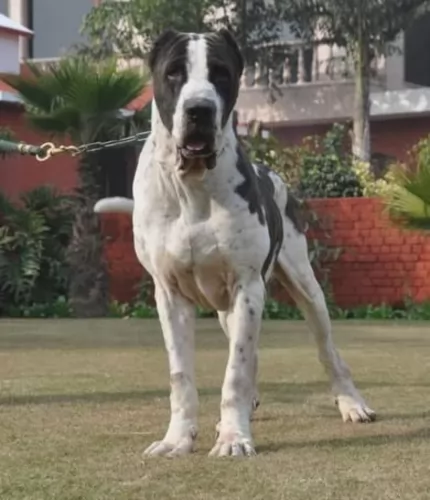 This well built, powerful dog breed is also known as Indian Alangu Mastiff or Pakistani Mastiff. These dogs come from the Punjab and Sindh region of the Indian subcontinent. It is believed that mastiff dogs came with British soldiers during the British invasion, however English Mastiffs, Bulldogs, Bull Terriers and Great Danes are seen as potential ancestors of this large dog.
This well built, powerful dog breed is also known as Indian Alangu Mastiff or Pakistani Mastiff. These dogs come from the Punjab and Sindh region of the Indian subcontinent. It is believed that mastiff dogs came with British soldiers during the British invasion, however English Mastiffs, Bulldogs, Bull Terriers and Great Danes are seen as potential ancestors of this large dog.
There are disputes about the country of origin of this breed, and some people claim that the dog comes from India, while others say it comes from Pakistan. Certainly in Pakistan these dogs are still used for fighting.
 It is believed that the Tamaskan has been specifically bred to resemble a wolf, and he does too.
It is believed that the Tamaskan has been specifically bred to resemble a wolf, and he does too.
They aren’t recognized by the Federation Cynologique Internationale as they aren’t purebred. In fact they aren’t recognized by any kennel club, being crossbred with other dog breeds such as the German Shepherd, Siberian Husky and Alaskan Malamute.
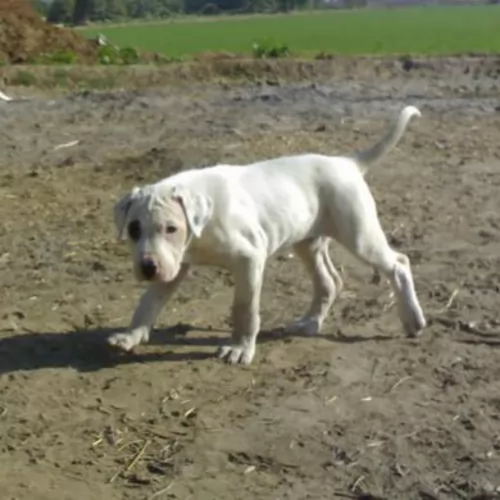 The Bully Kutta is a big, heavy, muscular dog, standing at roughly 81 – 89cm and weighing in at 70–90kg. He isn’t particularly good with children or with other pets simply because the dog is aggressive by nature. If you do opt for this large breed, you’re going to need a large garden and he is going to require a lot of exercise.
The Bully Kutta is a big, heavy, muscular dog, standing at roughly 81 – 89cm and weighing in at 70–90kg. He isn’t particularly good with children or with other pets simply because the dog is aggressive by nature. If you do opt for this large breed, you’re going to need a large garden and he is going to require a lot of exercise.
This is a dog breed that is going to require socialization and training if you want him to be obedient and calm, as he is inclined to be a dominating breed. He’s an intelligent dog and when well trained, he makes a splendid pet with firm, fair owners.
The Bully Kutta has a large, broad head which is supported by a thick well-muscled neck. The skin around his lower jaw is loose. The ears are short, set high and are mostly cropped, but other times they are left to flop over. The tail is sometimes docked but these days mostly left long and tapered.
He has a short smooth coat and is essentially white in color although the coat can also be fawn, brown, black or brindle.
 The beautiful Tamaskan dog is large, standing at between 61 and 71cm in height and weighing between 23 and 45 kg.
The beautiful Tamaskan dog is large, standing at between 61 and 71cm in height and weighing between 23 and 45 kg.
It is a mix between several sled dogs – Siberian Husky and Alaskan Malamute. The thick double coat is coarse and can be grey, cream, black or reddish and the tail of the Tamaskan is wolf-like too – thick and bushy.
His ears are erect and alert and he has sharp hearing. His almond shaped eyes can be yellow or brown and they are alert and bright and don’t miss a thing.
The Tamaskan is capable of becoming a good family pet, being gentle with children and accepting of other dogs. His high intelligence makes it that he can learn a lot of simple commands.
Because he has been a pack dog, he doesn’t like to be left alone. He is social and as a pet he will want to be an interactive part of his human family. Leaving him unsupervised for days on end will see him getting up to mischief.
He will die of depression, boredom and loneliness if he is put into the back yard and ignored.
They are certainly not recommended for life in the city but will need to have a large space to run and play.
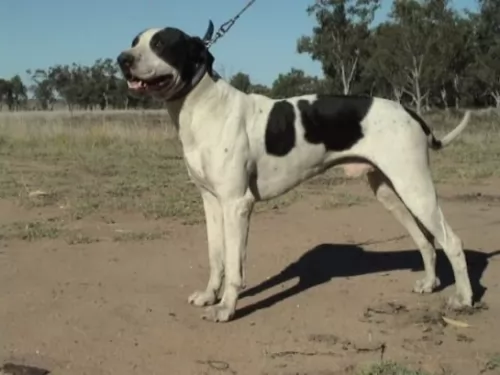 The Bully Kutta is a powerful, imposing dog and they have been nicknamed the ‘Beast from the East’. Unfortunately it is this dog’s thick bones, his looks and his strength that have him used for cruel dog fighting in Pakistan.
The Bully Kutta is a powerful, imposing dog and they have been nicknamed the ‘Beast from the East’. Unfortunately it is this dog’s thick bones, his looks and his strength that have him used for cruel dog fighting in Pakistan.
When not used for fighting, he makes a loyal, devoted companion for the owner who ensures proper socialization and training. Well raised Bully Kuttas are then good with children, being loving, protective and playful.
One just hopes that the future of this giant dog breed is brighter, and that he will be looked upon as more of a companion that just a dog-fighting object to bring in money for his owner.
 The Tamaskan may look like a wolf but he isn’t aggressive. He’s looks can be to your advantage because intruders think twice before confronting a ‘wolf’.
The Tamaskan may look like a wolf but he isn’t aggressive. He’s looks can be to your advantage because intruders think twice before confronting a ‘wolf’.
Little do they know that this is a loving, loyal dog that makes an excellent playmate for children. They’re social too and want to be with their family a lot of the time.
They’re dogs so devoted to their human family that they can even suffer with separation anxiety.
Give him the love and exercise he craves and you’ll find in him the most awesome canine friend.
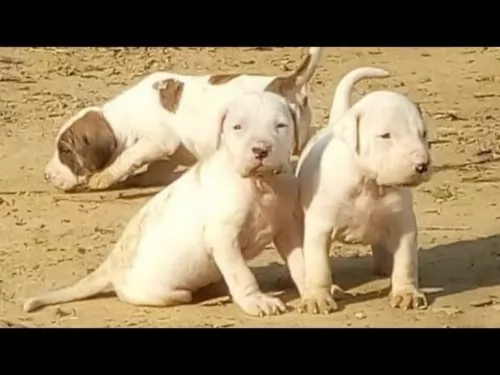 Your Bully Kutta is generally a healthy dog and not often affected by hereditary diseases, but with giant breeds such as this you will have to look out for diseases common to large dogs.
Your Bully Kutta is generally a healthy dog and not often affected by hereditary diseases, but with giant breeds such as this you will have to look out for diseases common to large dogs.
Typical illnesses to watch out for will include hip dysplasia, arthritis, skin allergies and bloat.
This is an inherited condition where the hip joint is improperly formed. For your Bully Kutta it causes wear and tear as well as stiffness in the hips and your dog battles to rise after lying down.
Arthritis in your dog can be managed but it can cause a lot of discomfort for him. This inflammation of the joints can cause pain and stiffness. It is more often seen in older dogs. It can also start at an early age because of problems with bone and joint development and abnormal rubbing within the joint.
Today there are a number of therapy options that can bring some kind of relief to your dog.
 Your healthy Tamaskan, even though he isn’t prone to common genetic health problems, can get any one of the many dog illnesses there are, although this is highly unlikely.
Your healthy Tamaskan, even though he isn’t prone to common genetic health problems, can get any one of the many dog illnesses there are, although this is highly unlikely.
However without good food, exercise, love and care, he can also be susceptible to parasites, rabies, parvovirus, hip dysplasia, bloat, skin infections and cancer.
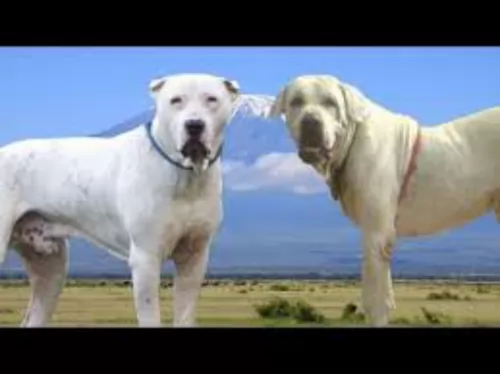 The short coat is low maintenance and as a moderate shedder too, all that is required really is to give your Bully Kutta a good brush twice a week to keep the coat in good condition.
The short coat is low maintenance and as a moderate shedder too, all that is required really is to give your Bully Kutta a good brush twice a week to keep the coat in good condition.
Brush his teeth 2 or 3 times a week with special canine-toothpaste and toothbrush to prevent plaque build-up. He’s a drooler too, so you will need to wipe his face and maybe your clothes of slobber from time to time.
This strong, muscular dog of yours will require an excellent diet. It’s always wonderful if you can give him home-made food such as vegetables, rice and meat. These days you get excellent commercially manufactured food for dogs, and your vet can advise you on the best food for a large, active dog such as the Buly Kutta.
Raw meat is absolutely essential for your dog from time to time and will ensure that his coat doesn’t become dull and with bald spots. Remember, that before dogs were domesticated they used to live on raw meat, so see that he gets some raw meat to prevent skin disorders. Make sure your large pet has a constant supply of fresh, cool water.
Bully Kuttas are going to need a walk every day in the form of exercise. If he is socialized you can take him into the park for ball games. He is a dog that will require plenty of space.
 The Tamaskan Dog is very active. He just loves activity - long walks and hikes and lots of running off a leash. He’ll love ball games too – anything that keeps him mentally and physically active.
The Tamaskan Dog is very active. He just loves activity - long walks and hikes and lots of running off a leash. He’ll love ball games too – anything that keeps him mentally and physically active.
Provide your beautiful, active Tamaskan dog with top quality food that is rich in protein. You can give him one of the quality commercially manufactured foods – just check out the ingredients on the packaging and go for the dog foods with wholesome, natural ingredients in them.
Your Tamaskan is part of the family and deserves some home-made food. Nothing spicey and exotic as you’ll sit with stomach problems. Boiled chicken, brown rice or pasta and spinach, sweet potatoes and carrots are a super healthy choice and food like this won’t play havoc with your dog’s digestion.
This food can all be chopped up and small portions added into the dry kibble twice a week.
●This is a fairly low maintenance dog. He does shed so a good brush twice a week will be sufficient for him.
●When you brush him, check him over for unusual lumps. Look inside his eyes and inside his mouth as he can’t tell you about a bad tooth that could be causing him pain. Check inside his ears too for signs of redness. If you don’t want to do these things, at least send him to a professional groomer who will do it all for you.
●Have your pet neutered or spayed if you want to avoid puppies. This can be beneficial for your pet’s health too.